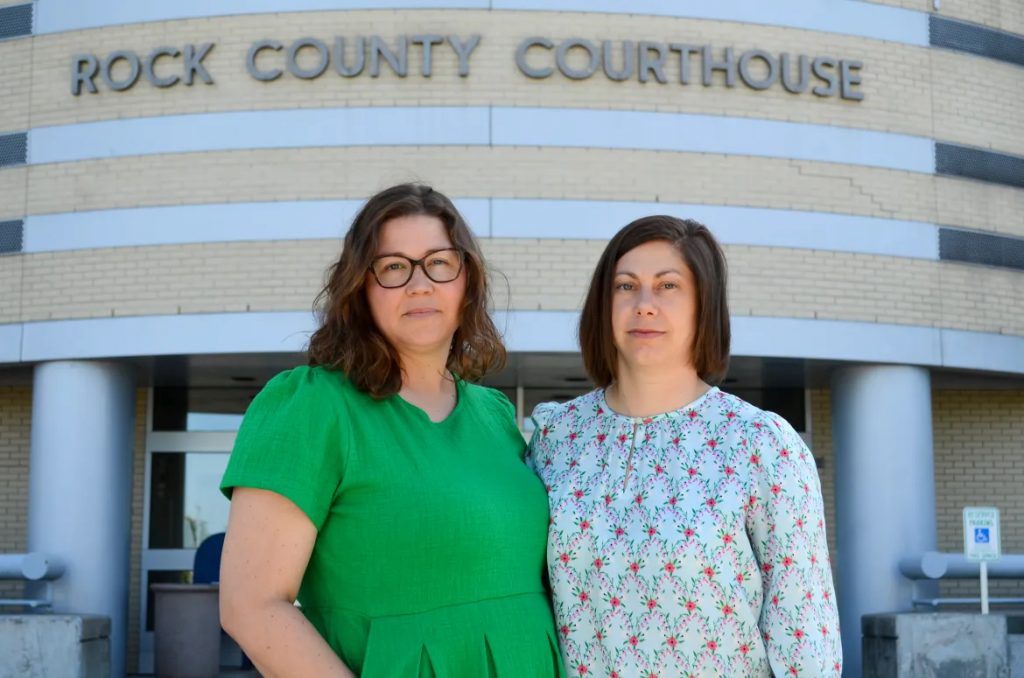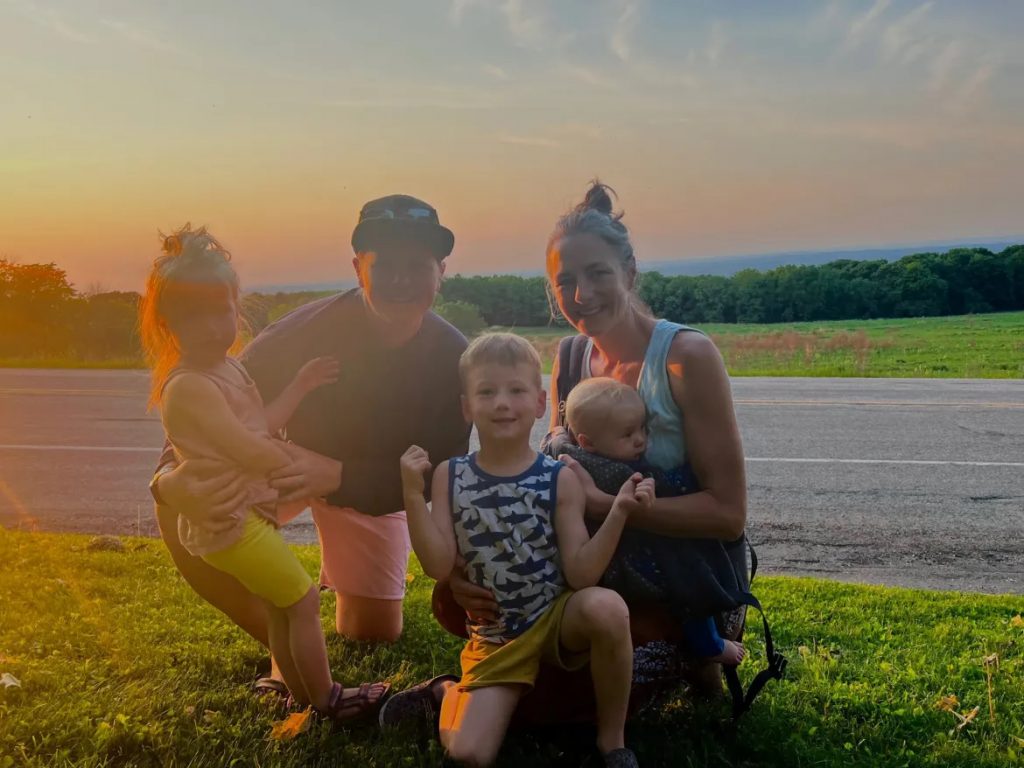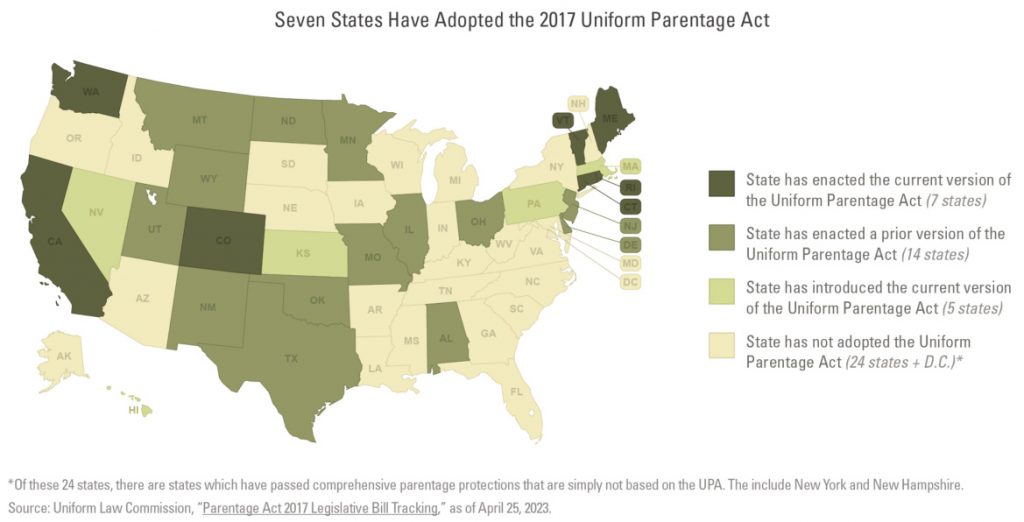Despite Legal Gay Marriage, Wisconsin Laws Still Centered On Husband and Wife
From birth certificates to court documents, same-sex parents have concerns.

Jamie Gaffke, left, and her wife, Ruth Vater, went to the Rock County Courthouse in Janesville, Wis., in 2014 to secure both of their parental rights for their first son. Because of a lack of updated state laws, same-sex parents in Wisconsin worry their parental rights won’t be honored by future court or administrative decisions. (Joey Prestley / Wisconsin Watch)
This story was originally published by Wisconsin Watch.
When Jamie Gaffke gave birth to her first son in 2014, she and her spouse spent about $3,000 on a lawyer to ensure among other things that both of their names appeared on the birth certificate.
One reason the expense was necessary at the time: On birth certificates, according to Wisconsin statutes, the parents in artificial insemination cases are defined as the mother and the “husband of the mother” when the individual is conceived or born.
The case came shortly after the federal courts struck down Wisconsin’s 2006 constitutional amendment banning same-sex marriage. But even in 2018 — three years after the U.S. Supreme Court had legalized same-sex marriage nationwide in the landmark decision Obergefell v. Hodges — Gaffke and Vater had to return to court to secure Vater’s parental rights for their second son.
For many same-sex couples in Wisconsin, the Obergefell decision being commemorated now during Pride Month was only one step in an incomplete legal journey.
State law still includes more than 100 references to “husband” and nearly as many references to “wife,” a Wisconsin Watch review found.
Those sections of the law include documents and laws related to not just birth, marriage and divorce, but also taxes, fishing licenses and veterans home accommodations. Even the definition of “parent” is outdated, including either a biological parent, a parent by adoption or a “husband who has consented to the artificial insemination of his wife.” The state’s unconstitutional amendment banning same-sex marriage and the “Family Code” in state statute, which refers specifically to “husband and wife,” remain on the books.
Court decisions and administrative actions under Democratic Gov. Tony Evers have blocked the practical effects of those terms — for now. But the 2022 revival of Wisconsin’s 1849 abortion ban after the U.S. Supreme Court overturned federally guaranteed abortion rights reminds many in the LGBTQ+ community that some rights, once granted, can still be taken away.
“It’s really frustrating because most folks across the state of Wisconsin support the rights of our family, but the law doesn’t,” said Vater, whose family now lives in Madison. “Most people assume that the status for families like ours is much safer and better than the one we actually live with. The reality of our situation is much more tenuous than most people realize.”
Bipartisan legislation stalls
Wisconsin is among a small number of states that include discriminatory language against same-sex couples in how they define “parent,” according to a Wisconsin Watch review of all 50 state laws. Only two states — Wisconsin and South Dakota — include a reference to “husband” in the primary definition of “parent.”
At least 21 states have adopted neutral language through a law known as the Uniform Parentage Act, according to a recent report from the Movement Advancement Project, a research group that promotes equity and inclusiveness. Wisconsin is among 29 states that have not.
Maine, for example, in 2016 changed its definition of parent to include a person if “the person and the woman giving birth to the child are married to each other and the child is born during the marriage.”
In Wisconsin, a once bipartisan effort to update state law to include gender neutral terminology for spouses and parents has stalled in the Republican-controlled Legislature.
Sen. Mark Spreitzer, D-Beloit, and several colleagues introduced bills to update the language in each of the past four sessions. The 2019 bill had two Republican co-sponsors, Reps. Todd Novak, R-Dodgeville, and Joel Kitchens, R-Sturgeon Bay.

Wisconsin state Sen. Mark Spreitzer, D-Beloit, speaks at a Pride flag-raising ceremony outside the Wisconsin State Capitol on June 1, 2023, to celebrate the beginning of Pride month. Spreitzer chairs the Legislature’s LGBTQ+ caucus and has co-authored legislation that would replace gendered references in state law with neutral language. (Drake White-Bergey / Wisconsin Watch)
Spreitzer said when he has talked to Republican colleagues about the bill, which he expects to introduce again later this session, the term “let sleeping dogs lie” comes up.
“‘You’ve got your win at the U.S. Supreme Court, why do you want me to take a vote on something I’m going to take heat from my base for?’ ” Spreitzer said, characterizing the responses.
“Most legislators don’t even realize the statutes say this,” said Novak, who declined to sponsor last session’s bill after clashing with the Legislature’s LGBTQ+ caucus over his support of an unsuccessful measure to ban transgender women from women’s sports.
Evers has proposed revising state statutes to incorporate gender-neutral terms in each of his last two budget requests, but the Republican-controlled Joint Finance Committee removed the language as part of a broad motion removing non-fiscal policy measures.
Senate Majority Leader Devin LeMahieu, R-Oostburg, and Assembly Speaker Robin Vos, R-Rochester, did not respond to requests for comment.
Public opinion, court majorities shift on same-sex marriage
Voters amended the Wisconsin Constitution in November 2006 by a 59%-41% margin to state: “Only a marriage between one man and one woman shall be valid or recognized as a marriage in this state. A legal status identical or substantially similar to that of marriage for unmarried individuals shall not be valid or recognized in this state.”
The Obergefell decision nullified that language, but it will remain in the state constitution unless the Legislature in two consecutive sessions votes to remove it, and voters approve the change. Should a future U.S. Supreme Court overturn Obergefell, some warn Wisconsin’s constitutional ban on same-sex marriage could again take effect.
In a concurring opinion last year to Dobbs v. Jackson Women’s Health Organization, which overturned the half-century constitutional right to an abortion before viability, conservative Justice Clarence Thomas said the court “should reconsider all of this Court’s substantive due process precedents” — including the 5-4 same-sex marriage ruling. The court now has a 6-3 conservative majority.
Megin McDonell, executive director of FAIR Wisconsin, an LGBTQ+ advocacy organization, said there’s “definitely value” in updating the statutes.
“We want to make it permanent in the statutes, or as permanent as the statutes can be,” she said.
“This is the law of the land in all 50 states,” McDonell added. “We should update our state statutes just to reflect that. … Cleaning up the statutes and fixing the language would provide more clarity, more recognition for people.”
Asked for a response to advocates trying to neutralize gender-specific language in state law, Julaine Appling, president of Wisconsin Family Action, the lead organization opposing same-sex marriage, chuckled and said, “I guess that ship has sailed.”
She later backtracked on using that phrase adding, “I will fight every single day to retain the terms husband and wife, mother and father, male and female, all those terms” in state law. Appling explained that retaining the terms is important in case Democrats take control of Wisconsin’s GOP-run Legislature.
“The minute we don’t have a more conservative majority in the state Legislature,” she said, “is the minute everything like that changes.”
There’s no doubt public opinion has shifted sharply on same-sex marriage in the past generation. In 1996, when Congress passed DOMA, just 27% of respondents nationwide told Gallup they approved of same-sex marriage. In 2022, that number was 71%.
Husband and wife in Wisconsin law
In June 2021, Evers issued an executive order directing “each cabinet agency to use gender-neutral language whenever practicable in external documents, including but not limited to: using gender-neutral terms and pronouns, drafting to eliminate the need for pronouns, omitting superfluous gendered words, and making any reference to gendered family relations, to the extent allowable by state and federal law.”

Gov. Tony Evers speaks at a Pride flag raising ceremony outside the Wisconsin State Capitol building on June 1, 2023, to celebrate the beginning of Pride month. Evers signed an executive order in 2021 directing Wisconsin state agencies to make forms and documents gender neutral. (Drake White-Bergey / Wisconsin Watch)
That order covered administrative rules, guidance documents, manuals, websites and all similar documents. But it could not re-write statutes. That’s the Legislature’s job.
Wisconsin state statutes remain riddled with language that excludes same-sex married couples. For example, the definition of “parent” that refers specifically to “husband” appears in multiple sections of law, such as for bone marrow transplants, juvenile justice and access to children’s medical records.
Other examples where “husband” and “wife” still appear in state law include:
- The crime of theft doesn’t apply if the perpetrator and the victim are “husband and wife.”
- For bank accounts, marital accounts are defined as those who “claim to be husband and wife.”
- State law nearly covers same-sex couples in a section on veterans homes, acknowledging that the second priority for housing goes to spouses of those who qualify for a veterans home. But it later notes the department may deviate from that order “to prevent the separation of husband and wife.”
- Divorce proceedings allow couples to attempt reconciliation during which time they may attempt to live together as “husband and wife.”
- Statutes refer to a “combined husband and wife resident fishing license.”
- A homestead tax exemption applies to land owned “by husband and wife jointly.”
- Even wild rice harvesting license rules say immediate family members, including “husband and wife,” may share licenses.
Same-sex couples take cases to court
Evers’ order came after years in which same-sex couples had to return to court to ensure equal treatment under the law, even after it was legalized nationally.
“There was just a time when the language didn’t match the reality on the ground,” said Juscha Robinson, an attorney who has worked on real estate and estate planning cases for same-sex couples. “You would have couples flipping coins over who was going to be husband and who was going to be wife.”
Even though the 2015 high court ruling required that same-sex couples be granted immediately all of the same rights as heterosexual couples, Wisconsin and several other states continued to resist.
The Department of Health Services under Republican Gov. Scott Walker failed to update birth certificate forms to accommodate same-sex couples, despite employees expressing confusion internally about how to address the issue.
In 2016, a federal judge in Madison granted a married female couple and other similarly situated couples the right to a birth certificate listing both spouses, suggesting that DHS update its forms. A 2017 U.S. Supreme Court decision affirmed the right to have both spouses listed on birth certificates nationwide.

A Progress Pride flag flies above the Wisconsin State Capitol’s east wing. Wisconsin is one of two states that refer to a “husband” in the statutory definition of parent. Attempts to change that have stalled in the Republican-controlled Legislature. (Drake White-Bergey / Wisconsin Watch)
Around that time, other official forms in Wisconsin began to change. The Wisconsin Court Records Management Committee began updating divorce and child custody forms to include gender-neutral language in 2017, according to archived meeting minutes. Previously divorce forms specifically referred to husband and wife, but now refer to petitioner A and B.
Judges and court officials from around the state heard no objections as they oversaw updates to the forms, according to Court Information Officer Tom Sheehan.
Milwaukee County Circuit Judge Kevin Martens, chair of the forms subcommittee, said court decisions — not political considerations — drove the changes in the forms. Should a future U.S. Supreme Court decision overturn the right to same-sex marriage, the current wording on the forms should suffice, he said.
“Even if that were the case, it wouldn’t change identifying the parties as ‘petitioner,’ ” Martens said. “You wouldn’t go back to a caption that said ‘husband and wife.’ You wouldn’t need to.”
Fight for equal rights continues
When Laura Megna, 37, of Madison, had her first child in 2018, the birth certificate form she and her wife filled out at the hospital still asked for the name of the “mother” and “father.” They crossed out those words and wrote in “parent” and “parent.”

Laura Megna, right, pictured with her wife and three children, has seen the evolution of how Wisconsin handles birth certificates for same-sex couples since the U.S. Supreme Court legalized same-sex marriage in 2015. (Courtesy of Laura Megna)
The hospital mailed in the form and the state sent back a proof of the final birth certificate asking for any corrections. It still said “mother” and “father,” so they corrected it again. The final birth certificate came back with the correct titles.
Megna, who is the family liaison care coordinator at UnityPoint Health-Meriter, said the process was similar in 2020 when she had their second child, but there was greater awareness in the health care world that the change was possible. Last year, when their third child was born — after Evers’ executive order — the form had a “parent” and “parent” option.
LGBTQ+ legal advocacy groups recommend all same-sex parents not rely on birth certificates, but also have courts legally recognize their parental rights, said Emily Dudak Leiter, an attorney at the Law Center for Children and Families in Madison.
“It still comes down to the culture in our country,” Dudak Leiter said. “That’s why all of this is more societal, not legal. It’s until you don’t have to worry about that unfairness, that’s when I won’t want a court order for every single one of my clients.”
The nonprofit Wisconsin Watch (www.WisconsinWatch.org) collaborates with WPR, PBS Wisconsin, other news media and the University of Wisconsin-Madison School of Journalism and Mass Communication. All works created, published, posted or disseminated by Wisconsin Watch do not necessarily reflect the views or opinions of UW-Madison or any of its affiliates.
-
Wisconsin Lacks Clear System for Tracking Police Caught Lying
 May 9th, 2024 by Jacob Resneck
May 9th, 2024 by Jacob Resneck
-
Voters With Disabilities Demand Electronic Voting Option
 Apr 18th, 2024 by Alexander Shur
Apr 18th, 2024 by Alexander Shur
-
Few SNAP Recipients Reimbursed for Spoiled Food
 Apr 9th, 2024 by Addie Costello
Apr 9th, 2024 by Addie Costello























